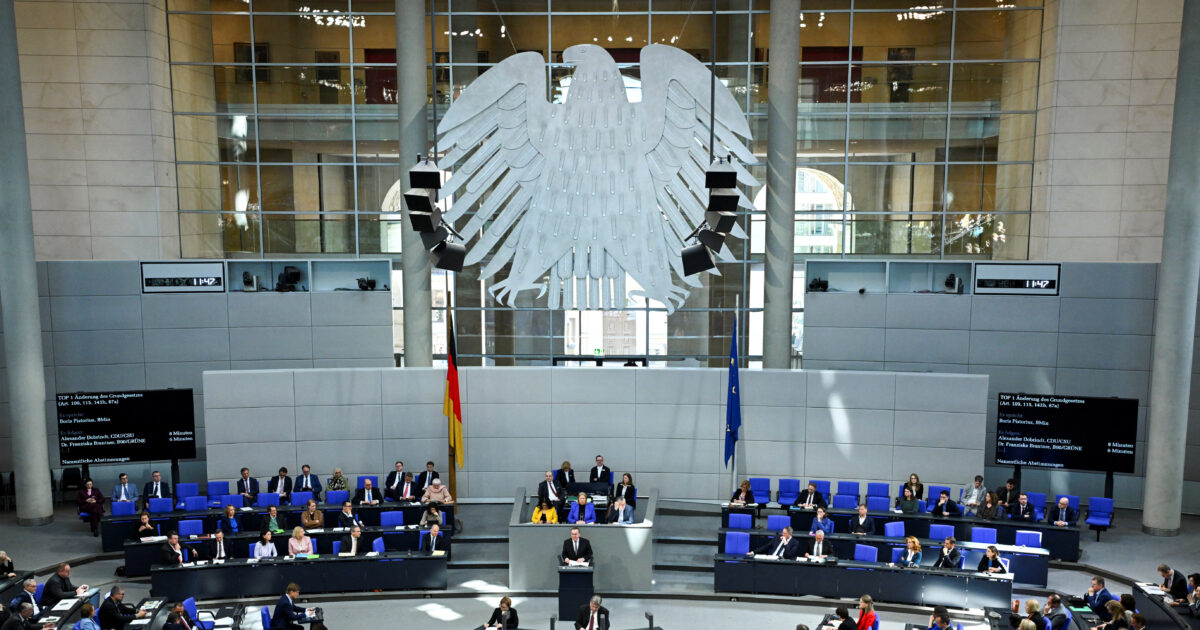Historical dimensions can be characterized today’s (18.3.2025) voting of the growth package of government expenditure 1 trillion. Euro for defense, infrastructure and climate from its federal parliament Germany (Bundestag).
Specifically, more than 2/3 of the MPs of the House of Germany voted for the proposal submitted by the CDU – CSU (center -right), the SPD (center -left) and the Greens (Ecologists), according to which the above amount of mammoth (through the debt increase) will be spent up to 12 years. and the subsidy of green transition. In order for the German state to increase its spending on this amount, without massively cutting other (social) spending, it had to reform the infamous “debt brake” provided by the country’s constitution since 2009.
According to this “brake”, the state could not increase their borrowing from international markets over 0.35% of GDP each year in order not to increase its total public debt.
With the new constitutional provision voted by the German Parliament today, the German state will be able to increase its lending by up to 1% of GDP each year. In other words, the application of this provision leads to triple the ability to borrow Germany in the long run and not extraordinary.
Pending the final green light for constitutional review
Before continuing the analysis of “what” this about Germany, Europe and the whole world, it should be made clear that in order to bring the new constitutional provision to increase debt, it must also be voted on by the Federal Council on Friday (21.3.2025). Land, something that the German economic press does not (attention: does not) take a given.
Assuming that the Bundesrat also votes (with a majority of 2/3) the constitutional review, then the CDU – SPD government with Chancellor CDU leader Friedrich Mertz, on the basis of the program in which they will end up until next Sunday (23.3.2025). Budget of 2025, based on the possibility of increasing public loan up to 1% of GDP (around € 50 billion instead of € 16 billion!).
How markets react to increased spending
The expectation of increasing public spending through increased public lending has already led to three trends in the market:
– Increasing the Frankfurt Stock Exchange Index in particular thanks to the prices of German Defense Industry Rheinmetall and Infrastructure Company Heidelberg Materials. Rheinmetall’s stock market value exceeded that of Volkswagen. And this is because, obviously, markets discount mass investments in new weapons systems. Some analysts estimate that investments through the 1 trillion package. The euro will give a breath to the German economy, which has been in recession for three years.
However, this recovery cannot come earlier than 2026 and – therefore – after a devastating wave of duties from the US, if Trump threats are implemented. In addition to increasing lending, increasing costs should also be funded by a cut of social spending, leading to an increase in subsequent trends.
– The increase in yields of German government bonds of 10 years, ie Germany’s borrowing costs. The yields today are at 2.8% against the 2.4% in late February, a few before the original Mertz package was locked. This means that the interest that the German government will pay to pay for the loans it will receive from the markets have increased by 1/6 (or 16%). Already analyzes have been referring to Germany’s increase in German debt by 35% – 40% or 1.5 trillion. Euro in the long run.
The bell for the excellent – to today – credit rating of Germany was now expanding the Fitch Evaluation House. However, it was not only the yields of German government bonds that increased, but of all European, together with Greek. This is because, along with the German package, the implementation of a European package (€ 800 billion) is expected to boost defense spending through a new European fund and through the activation of national escape saying.
– The euro’s appreciation against the dollar after a downward barrage especially after the first months after the US election to the US (November 5, 2024). The euro today is a breath away before 1 to $ 1.1 with dollars, making a 6.8% series since the beginning of January 2025! The appreciation of the euro over the dollar is anything but … delights Trump, who supports all his economic policy on the dollar appreciation, arming him even more to proceed with the implementation of his 25% duty on European products.
The implementation of such a threat is estimated (and) by the European Investment Bank that it will bring recession throughout the eurozone (together in Greece) and therefore in reduced state revenue and thus pressure on even greater public loan, possibly putting it in a vicious cycle of recession.
